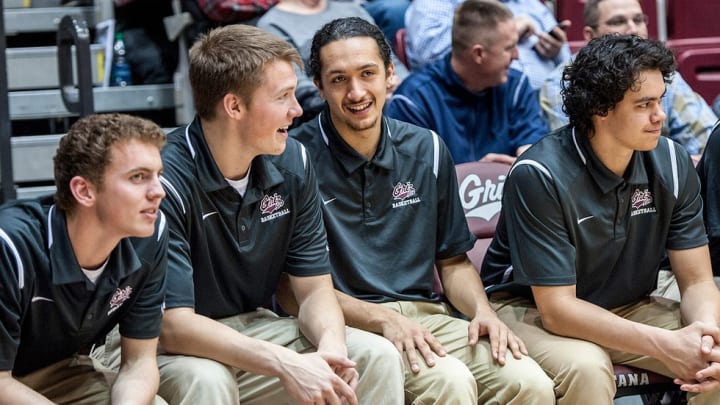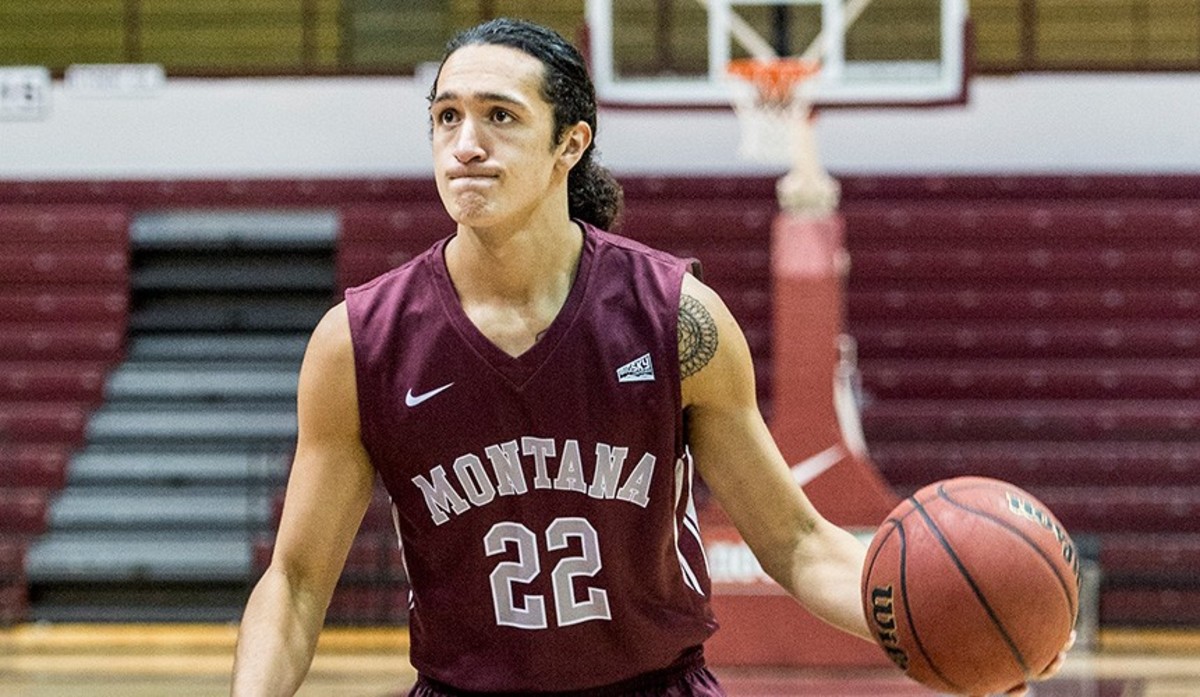From the rez to the Griz: Zack Camel Jr. follows in his uncle's footsteps to play for Montana

Like many kids on the Flathead Indian Reservation in northwest Montana, Zack Camel Jr. grew up idolizing JR Camel.
A former University of Montana standout from 1995 to '98, JR Camel set a UM career steals record that stood for more than a decade, charming Grizzly fans with superior athleticism. Always smiling, always laughing and always playing defense, he's fawned over anytime he walks back into Montana's gym, as long-time supporters pepper him with stories and questions. But JR, who will turn 42 on Thursday, would rather talk about the next Camel to to play for the Grizzlies: His nephew.
As a child, Zack Jr. tagged along with his dad, Zachary Camel Sr., and uncle JR everywhere, following them to pick-up games—Zack Jr. says that his uncle can still do a 360-degree dunk—and practices. Zack Sr. is in his 15th year as head coach of the Salish Kootenai College Bison, the reservation's community college, and JR is his assistant. Zack Sr., now 48 years old, says JR "has this big glow around him," captivating kids and adults alike with off-court charisma and on-court skills. "Zachary Jr. was right there inside it," says his father. "Now, playing at Montana has given him his own light."
Zack Jr. was born while JR played in Missoula, and became a fixture at UM games. He says almost every piece of athletic clothing he owned growing up had a Grizzly stitched on it. A member of the Salish and Kootenai tribes, he grew up on the reservation, about an hour north of UM's campus, with the understanding that he should never root for the Montana State Bobcats, UM's in-state rival. And when Zack Jr. walked on to the Montana basketball team this season after two years at Salish Kootenai College, he insisted on wearing No. 22, just like his uncle had.
It'll be a few months before No. 22 will be worn in a game, however, because Zack Jr., with some strong encouragement from second-year Montana coach Travis DeCuire and his staff, opted to redshirt the 2015–16 season. The Griz have a loaded backcourt—three starting guards average 10 points or more, contributing to Montana's 16–8 record and first-place standing in the Big Sky—and Camel, a combo guard, needed to pack muscle onto his lean, 6-foot, 165-pound frame. He's added 15 pounds since arriving on campus and explains in an exasperated tone, "At the beginning of the season, I just got hit by a bunch of [taller guys]; now at least I can bump them a little first." He needed to learn how to defend at the Division I level, too, a skill his uncle preaches as a requirement. "We're both only six feet tall, so we can't be liabilities on defense, like if we were 6'4," says JR.
*****
[youtube:https://youtu.be/8xGj9Zh_f3g]
On reservations across the country, Native Americans play a dazzling and dizzying brand of basketball that's sometimes knocked for being heavy on shots and short on defense. On and off-court stereotypes have held back talented athletes for years, a reality Zack Jr.'s family knows well. At Montana, JR worked to combat the notion that Natives don't play tough defense, grabbing 215 steals in his three-year career, a school record that stood until 2012. (He still holds the record for most steals in a single season, with 90, set in '98.) He's stressed to all his players at SKC, and especially his nephew, that both ends of the floor were crucial. Zack Jr. listened.
"I was brought up playing defense," Zack Jr. says. "It wasn't just run-and-gun in my family."
JR set the example, Zack Jr. says, for him and everyone else. Now, Zack Jr. waits his turn with the understanding that he'll be the next one kids consider a role model.
Problems on reservations are well-documented, as promising athletic careers are often disrupted by addiction and teen pregnancy. According to a 2009 study, Natives have the third highest teen birth rate in the United States among the five major ethnic groups, despite the fact that only two percent of all teens in the U.S. are of American Indian or Alaska Native descent. Decades of addiction have destroyed families on reservations: In 2012, Indian Health Services estimated the rate of alcoholism among Natives was six times higher than the U.S. average.
And yet, it's hard to leave the reservation. After growing up in close proximity to so many relatives, many Native kids struggle with severe homesickness if and when they move. Zack Sr. and his wife, Liz, raised their children on the reservation while wondering if they were doing them a disservice by sheltering them from the outside. But they chose to embrace community and culture, while modeling a modest lifestyle: Zack Sr. says that in 48 years, he has never drank alcohol or done drugs.
"You see enough of it out here (on the reservation), what drugs and alcohol do to people," Zack Sr. says. "I know people who missed years of their life because they were blacked out or high. I remember every minute. That's what I wanted my kids to see."
Now 20, Zack Jr. wants others to know there are two paths for young Natives: They can fall victim to the pitfalls that many assume are inevitable, or they can choose to shatter a stereotype and build a new reality. Above all else, he wants them to know it's O.K. to leave the reservation. From a young age his parents told him that chasing a dream didn't mean he was abandoning his people.
"My dad always said, 'Everywhere you go, you're taking your reservation, and your people, with you," Zack Jr. says. "I'm trying to make my family, and all Native people, proud."
It's a path other high-profile Native athletes have worked to forge in recent years. Former Louisville and current WNBA star Shoni Schimmel, who was raised on the Umatilla Reservation in Eastern Oregon, has spoken publicly about the honor she feels in setting an example for Native kids all over the country. Zach Jr. wants the same responsibility.
"We talk a lot about big moments in life," JR says. "It's big, it's good, for Zack, Jr. to have this opportunity. It's good for our family and our reservation."
JR started to think his nephew could play college basketball when Zack Jr. was a junior in high school. At Hoopfest, the world's largest 3-on-3 tournament held each June on the streets of Spokane, Wash., Zack Jr. subbed in when JR's team lost a player to injury. They finished second in the under-6-foot division that year, playing 12 games in 97-degree heat without a sub. "I've been around for awhile, and I understand what guys can and can't do," says JR, who played three years in Prishtina, Yugoslavia (now Kosovo), after college. "In that tournament, we were playing against guys to played at Gonzaga, against grown men who knew Zack was a kid and tried to take advantage of him being smaller, and he held his own." They've won the last two under-6-feet championships and will go for a third this June without Zack (NCAA rules forbid college players from participating in non-sanctioned summer events).
Zack Sr. had realized his son's potential earlier: As a seventh grader, Zack Jr. accompanied his father to an adult basketball tournament in Pendleton, Ore., where he buried "five NBA three-pointers," according to his dad, while the crowd roared for the tiny kid bombing from long-distance. "In that game, I remember thinking, 'He's not afraid of the moment when the lights are the brightest," Zack Sr. says.

Courtesy Montana Athletics
Zack Jr. spent his first three years at Polson, a high school on the reservation that plays in the second-largest division in Montana. His senior year he transferred to Arlee, also on the reservation, where JR had taken over as coach before the 2012–13 season. (He resigned the next year.) Arlee is Class C in Montana, which is the state's smallest-school division but hosts the toughest route to get to the state tournament because it has the most member schools. At Arlee, Zack Jr. broke the single-season Montana assist record, dishing out 281, including a personal-best 23 one night in 2013. He added 12 points per game and was named All-State. He attributes his success to his dad, uncle and the fact that he didn't ever tire of the game: After high school workouts, Zack Jr. could often be found in the SKC gym, launching shots on the side while his dad ran practice.
He graduated high school in 2013 with a handful of small college offers but told his family, "I feel like if I don't go to Montana, I don't want to go anywhere else in the state." Montana coaches encouraged him to go the junior college route, so Zack Jr. joined his father and uncle at SKC while earning his associate's degree in business management. SKC is part of the American Indian Higher Education Consortium and plays its championship each year without knowing before tipoff which teams will show up at the national tournament. He averaged about 20 points (SKC doesn't keep official stats) and led SKC to back-to-back national titles before walking on at UM last summer. Practicing at Montana, he says, has been more fun than he anticipated: "Our redshirt team is really good, so we win a lot of drills in practice."
DeCuire, in his second year as head coach at UM, laughs when he hears this assessment. "I used to say that too, when I redshirted," says DeCuire, a Griz point guard from 1992 to '94. "It helps that they have a Pac-12 point guard (Oregon transfer Ahmaad Rorie) running the show but really, they are just as responsible as anyone for the season we're having.
"What I know about Native American basketball culture is that your heart, passion and ability to compete are necessities to survival," DeCuire says. "Zack gets that because it runs in their family. He might not be as athletically gifted as JR, but he's got that mental and physically toughness. He knows how to compete. We needed more people with that tenacity. We knew it would be contagious."
Zack Jr. finds that drive off the court, too. He's studying business management, with an eye on a master's, possibly in public health. He wants to move back to the reservation and work for the tribe, potentially as CEO of the reservation's hospital. He's an active member, attending tribe pow wows (his mom makes and sells "the best Indian tacos around") and staying up-to-date on council issues.
Zack Jr. played in just one game this year, an intra-squad scrimmage early in the season. But he feels like a superstar on every one of his frequent visits home when he's flooded with well wishes and high-fives from other natives who tell him how much pride he's bringing to his people.
"I've seen so many Natives who were good at basketball but they didn't figure it out, they got stuck [on the reservation]," Zack Jr says. "I always thought, 'Basketball is something I have to do before I grow up completely.'"
Zack Jr. followed his uncle. Now, he wonders, who will follow him?
